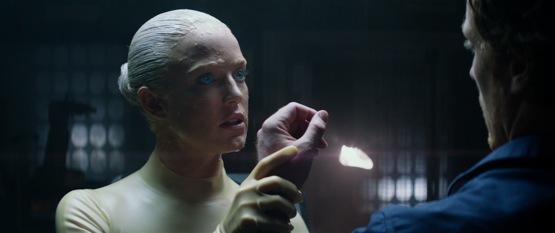 (3 / 5)
(3 / 5)
As productions, Transcendence and The Machine couldn’t be further apart.
The first is a $100 million Hollywood blockbuster starring Johnny Depp; the second was shot on 1% of that budget with a British TV actor best known as the villain from Die Another Day. Both, however, are science fiction debuts that deal with the theme of human consciousness, and what The Machine has over its more prominent sibling is focus and economy of storytelling.
The Machine is set in a hypothetical near future, a future where an ensuing war with China has plunged the UK into a deep recession. Stephens’ Vincent is a computer scientist with a dying, brain-damaged daughter, who turns to DoD funding as a chance to save her life.
Stephens is a mercurial actor, though his primary modes are blithe (he recently appeared in a revival of Noel Coward’s Private Lives) and careworn streaked with aggression (see him as Rochester in the BBC’s 2006 production of Jane Eyre). Vincent is mostly the latter, spending most of the film in darkened rooms, a would-be Dr. Frankenstein without the ego.
While vetting potential assistants, Vincent meets Ava (Caity Lotz), a brilliant young programmer. When Ava’s AI program almost beats the Turing test – an experiment that challenges a machine’s ability to pass for human – Vincent recruits her, pulling her into the shadowy world of military research.
Their boss Thomson (Denis Lawson) is an amoral number man, the type to watch the live feed of a murder while playing a round of golf in his office. Soon enough, the hopelessly inquisitive Ava strays where she should not and pays the price. As per their plan, though, Vincent uses her scans as the basis for his new creation.
The film is at its best in the little things, a litany of cinematic references, intentional or otherwise. There’s a red-coated figure who could have emerged straight from the Venetian canals of Don’t Look Now, the glowing skin of the BSG Cylons, and Ava 2.0 – The Machine herself – goes proverbially Nikita. Lotz turns in one decent and one great performance as the easy-going Ava and as the wide-eyed, childlike Machine respectively.
The Machine premiered at last year’s Tribeca Film Festival and also won the Against the Odds Prize at the British Independent Film Awards: it’s a neat, polished little film that does a lot with its limited budget.
Director Caradog W. James certainly has an eye for memorable imagery: a transparent exoskeleton filling with blood, the cat’s-eye glares of military test subjects. There’s an underground base and a conspiracy at work, but these genre trapping are all in service of the theme. Whereas Transcendence took its premise somewhat for granted, The Machine commits to world building. It’s also the more focused film and notably 40 minutes shorter.
Ultimately, though, the plot and characters at play here feel better suited to a TV series where they would have room to breathe; as it stands, The Machine can’t help but feel a little blinkered.
Despite those reservations, the film shows that it’s possible to explore huge ideas in an hour and a half, as long as you’re willing to scale down the size of your explosions. The Machine‘s inability to live up to the scale of Transcendence is, ironically, what makes it the better work.
While never quite excelling, The Machine doesn’t let you down either, and if the ending’s slightly happy, you can’t help but feel it’s earned it. The Machine is, in short, a very respectable three-star film.
